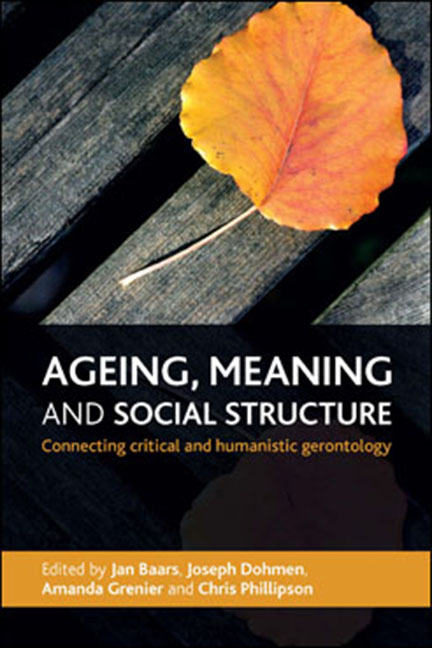Book contents
- Frontmatter
- Contents
- Notes on contributors
- Acknowledgements
- one Introduction
- two Connecting meaning with social structure: theoretical foundations
- three My own life: ethics, ageing and lifestyle
- four Rethinking agency in late life: structural and interpretive approaches
- five Dementia: beyond structures of medicalisation and cultural neglect
- six Self-realisation and ageing: a spiritual perspective
- seven Social ability or social frailty? The balance between autonomy and connectedness in the lives of older people
- eight Critical perspectives on social work with older people
- nine Community-based participatory action research: opportunities and challenges for critical gerontology
- ten Commentary: contingent ageing, naturalisation and some rays of intellectual hope
- Index
eight - Critical perspectives on social work with older people
Published online by Cambridge University Press: 07 September 2022
- Frontmatter
- Contents
- Notes on contributors
- Acknowledgements
- one Introduction
- two Connecting meaning with social structure: theoretical foundations
- three My own life: ethics, ageing and lifestyle
- four Rethinking agency in late life: structural and interpretive approaches
- five Dementia: beyond structures of medicalisation and cultural neglect
- six Self-realisation and ageing: a spiritual perspective
- seven Social ability or social frailty? The balance between autonomy and connectedness in the lives of older people
- eight Critical perspectives on social work with older people
- nine Community-based participatory action research: opportunities and challenges for critical gerontology
- ten Commentary: contingent ageing, naturalisation and some rays of intellectual hope
- Index
Summary
Introduction
Using social work with older people as a case study, this chapter argues that the marginalisation of social work with older people in the UK effectively holds a mirror to the wider exclusion of those within this age group who use social work and personal social care services – in effect, older people with high support needs. The chapter draws on a critical perspective to highlight the complexities that are involved in contemporary, professional social work practice with older people, and points to future directions in the development of a professional social work role into the future. It examines first challenges facing social work practice with older people; second, trends in service provision; and third, developments in critical perspectives on social work with older people.
Challenges in contemporary social work practice with older people
In the UK, the role and purpose of social work with older people has always been contested and perceived as an under-valued area of practice when compared with other areas of social work practice, such as with children and families (Richards, 2000). While there is now some variation in the extent to which social work represents a visible contribution to the social care agenda with older people among the devolved nations of the UK, it has long been viewed as an area of work with limited occupational potential (Lymbery, 2005). The fragile and uncertain basis for social work with older people in the UK (shared with many other European countries) has been further eroded by the consequences of neoliberal policies in welfare services over the 1990s and 2000s. These have had a profound impact on the visibility, role and purpose of social work with older people. In respect of England, there has been a decline in demand for qualified social workers with adults CFWI, 2012), reinforced by budget cuts and a view that professional social work is less relevant in the current climate of reform (Beresford, 2012). Increasingly, a narrative about the role and purpose of social work with older people is notable by its absence or rendered invisible by the emphasis on the wider ‘social care’ agenda.
- Type
- Chapter
- Information
- Ageing, Meaning and Social StructureConnecting Critical and Humanistic Gerontology, pp. 139 - 156Publisher: Bristol University PressPrint publication year: 2013



